If you’re thinking about starting a blog in 2025, you’re probably wondering:
Which are the best free blogging platforms?
Which platform has the best features and customization?
Can I make money from a free blog?
Well, I wondered the same thing. So, I spent hours researching, testing, and comparing the best free blogging platforms that bloggers absolutely love—and now, I get why they’re so obsessed!
Whether you’re looking for the best places to blog for free, best free blog hosting sites, or simply wondering how to create a blog for free, this guide has all the answers you need.
Let’s break down the 10 best free blogging platforms, their pros, cons, and why bloggers can’t stop raving about them.
What Makes a Blogging Platform “The Best”?
Not all best free blogging platforms are the same. Before diving into the top 10, let’s look at what makes a free blogging site truly great:
🔹 Ease of Use – Can beginners start blogging quickly?
🔹 Customization – How much control do you have over design and branding?
🔹 Monetization – Can you earn money from ads, sponsorships, or memberships?
🔹 SEO & Growth – Does it help your blog rank well on Google?
🔹 Support & Community – Is there a strong user base and customer support?
Now, let’s break down the top 10 best blogging sites for free and why bloggers can’t stop raving about them!
1. WordPress.com – The Most Popular Free Blogging Platform
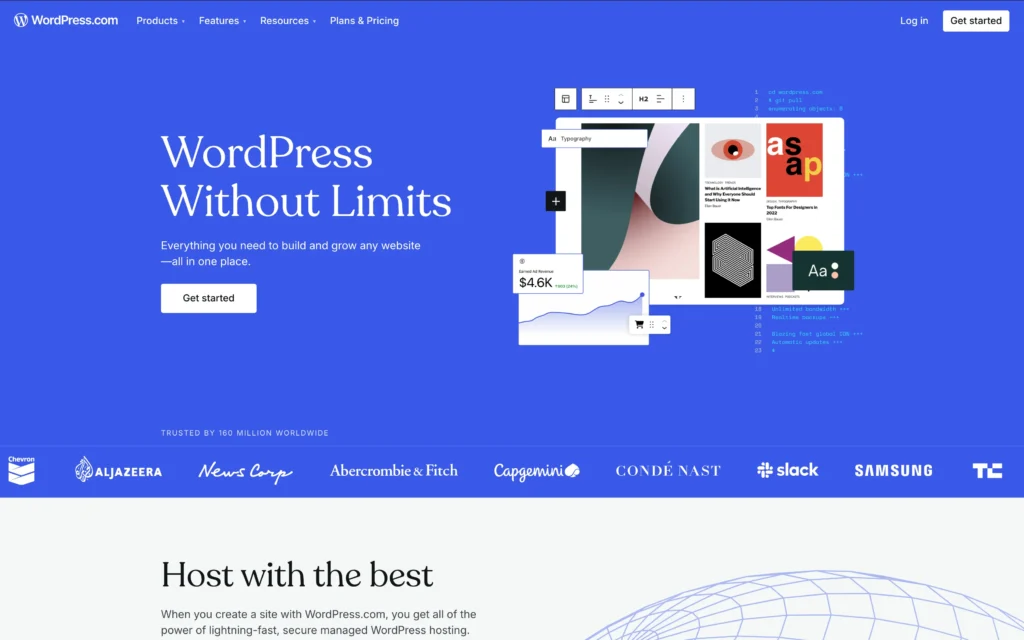
If you ask any seasoned blogger where they started, chances are they’ll say WordPress.com.
WordPress.com is the most widely used blogging platform, hosting millions of blogs worldwide.
If you’ve ever researched how to create a blog for free, you’ve probably come across WordPress.
While it’s often confused with WordPress.org (a self-hosted version that requires paid hosting), WordPress.com is a fully hosted free blogging platform, making it one of the best places to blog for free.
What makes WordPress.com stand out is its user-friendly interface, massive community, and SEO-friendly structure.
Unlike other platforms, WordPress allows you to create any type of blog—from personal blogs and portfolios to business blogs and professional websites. While the free version has some limitations, it’s still one of the best blog hosting sites free for beginners looking for an easy start.
Key Features:
🔹 Free subdomain (yourblog.wordpress.com).
🔹 Wide selection of free responsive themes.
🔹 Built-in SEO & analytics tools.
🔹 Large supportive community.
Best Use Cases:
✔ Personal blogs & portfolios.
✔ Beginners who want a structured, easy-to-use platform.
✔ Writers who want SEO-friendly blogging.
Pros:
✅ Easy to use and beginner-friendly.
✅ Strong SEO & analytics to help grow your blog.
✅ Huge community support & tutorials.
Cons:
❌ No Google AdSense on free plan.
❌ Custom domain requires paid upgrade.
❌ Limited access to advanced themes & plugins.
2. Blogger – The Google-Owned, Monetization-Friendly Platform

Blogger is one of the oldest and simplest free blogging websites, owned and managed by Google. It’s a favorite among beginners who want a no-fuss blogging experience.
Unlike other platforms that may restrict monetization, Blogger allows full integration with Google AdSense, making it one of the best free blog sites for earning money.
Because it’s part of Google’s ecosystem, Blogger integrates easily with Google Analytics, Google Search Console, and Google Drive, making it easy to track your blog’s performance.
While its design options are somewhat limited compared to WordPress blogs or blogs on Wix, it’s still a solid option for new bloggers looking for a hassle-free start.
Key Features:
🔹 Unlimited free storage & bandwidth.
🔹 Easy integration with Google Analytics & AdSense.
🔹 Free custom domain support.
Best Use Cases:
✔ Monetized blogs & niche sites.
✔ Beginners looking for a simple blog maker free.
✔ Writers who don’t need advanced customization.
Pros:
✅ Completely free with no paid plans.
✅ Supports Google AdSense (great for making money).
✅ Unlimited free hosting.
Cons:
❌ Outdated themes and customization options.
❌ Google can suspend your blog anytime.
3. Wix – Best for Stunning Blog Designs
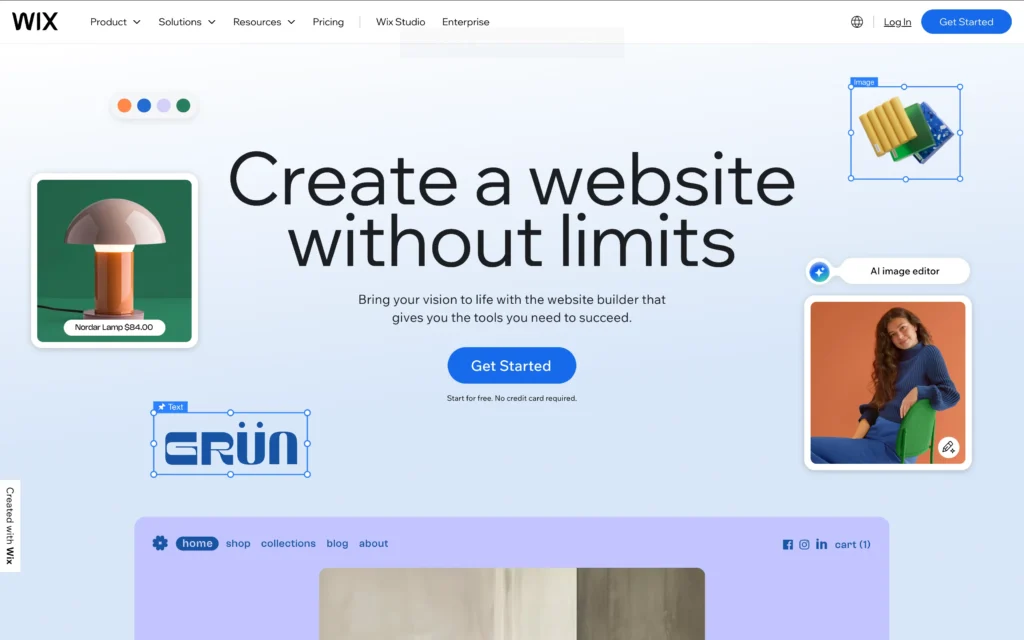
Wix is one of the best free blog pages for those who want a highly customizable and visually appealing blog. Unlike traditional blogging platforms that focus on writing, Wix is a drag-and-drop website builder that includes powerful blogging features. This makes it an excellent choice for bloggers who want both a blog and a website in one place.
What sets Wix apart is its user-friendly design tools, allowing complete creative freedom.
Unlike WordPress bloggers who rely on themes and plugins, Wix bloggers can drag, drop, and customize everything to match their brand. However, the free plan includes Wix-branded ads, which can only be removed with an upgrade.
Key Features:
🔹 Drag-and-drop editor (no coding required).
🔹 Over 500 customizable templates.
🔹 Mobile-responsive & SEO-friendly.
🔹 Built-in blogging app with scheduled posts.
Best Use Cases:
✔ Creative bloggers (fashion, design, photography, etc.).
✔ Small businesses that need a blog & website in one.
✔ Beginners who want an easy, visually appealing blog.
Pros:
✅ Highly customizable with a drag-and-drop interface.
✅ SEO & marketing tools included.
✅ No coding required.
Cons:
❌ Free plan includes Wix ads.
❌ Not as blogging-focused as WordPress or Blogger.
❌ Limited third-party integrations compared to WordPress.
4. Medium – Best for Writers & Thought Leaders
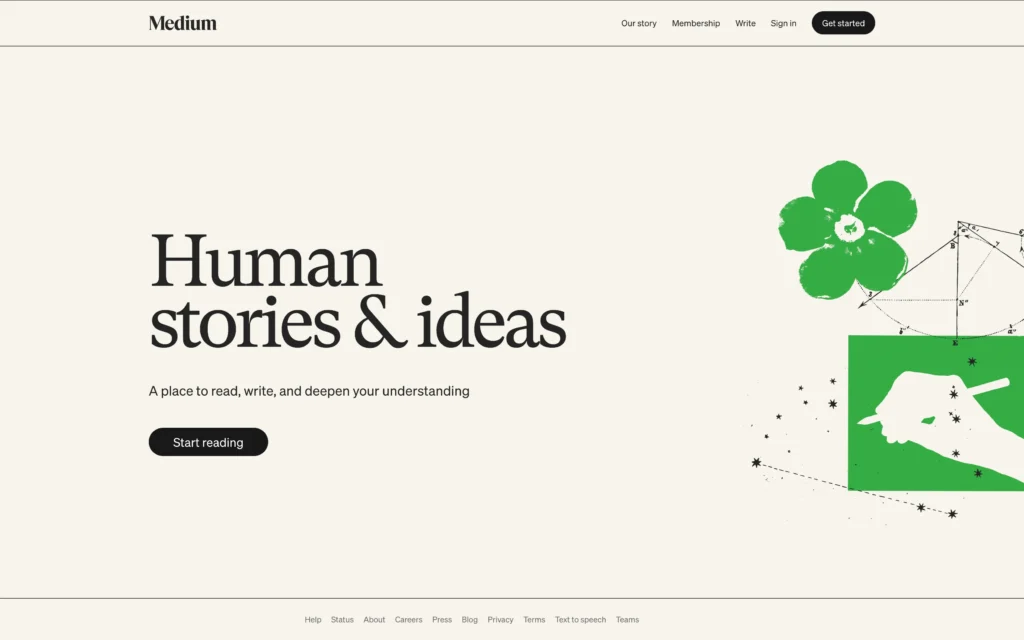
If you’re looking for a platform where writing is the focus, Medium is one of the best websites for blogging free. Unlike WordPress or Wix, which allow full website customization, Medium is designed solely for content creation. Bloggers don’t need to worry about themes, layouts, or plugins—just write and publish!
What makes Medium powerful is its built-in audience of millions. Instead of struggling to bring traffic to your blog, Medium helps distribute your content to its readers. Writers can also earn money through the Medium Partner Program, making it a great alternative to monetized blogs.
Key Features:
🔹 No setup required—just write & publish.
🔹 Huge built-in audience for exposure.
🔹 Medium Partner Program for monetization.
🔹 SEO-friendly and distraction-free writing interface.
Best Use Cases:
✔ Writers & journalists who want to focus on content.
✔ Bloggers looking to gain exposure without SEO work.
✔ Thought leaders & industry experts.
Pros:
✅ Minimalist design & easy to use.
✅ Monetization through Medium’s Partner Program.
✅ Engaged audience—great for visibility.
Cons:
❌ No customization options.
❌ Medium owns your content—you have limited control.
❌ Monetization depends on Medium’s revenue-sharing model.
5. Tumblr – The Ultimate Social and Microblogging Platform
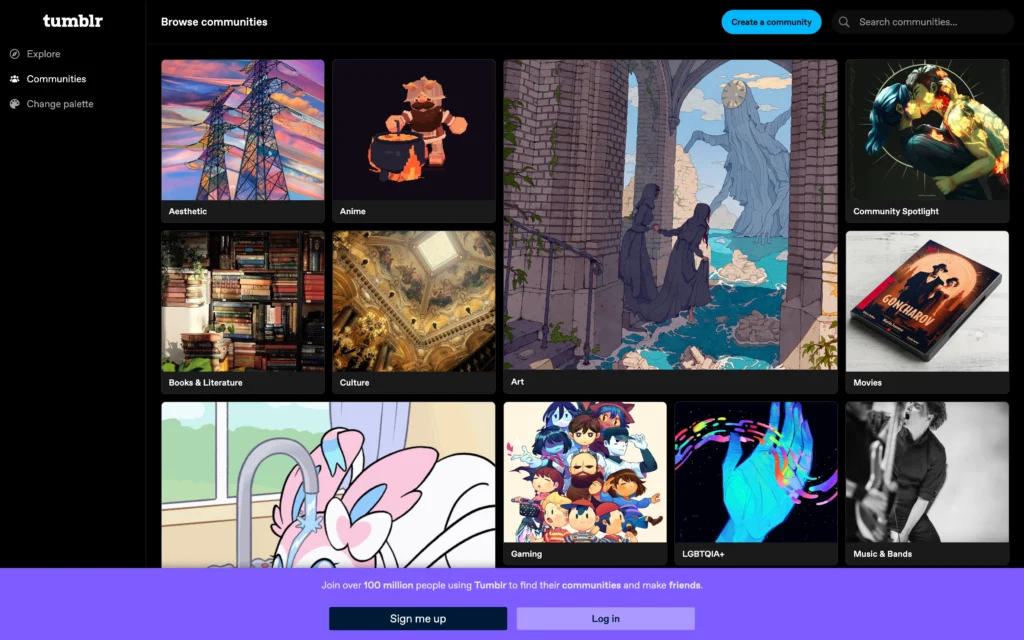
Tumblr is a hybrid platform that blends blogging and social media. If you enjoy sharing quick updates, multimedia posts, and engaging with a built-in community, Tumblr is one of the best free blogging websites.
Unlike traditional blogging sites, Tumblr allows users to share GIFs, videos, music, and short blog posts effortlessly. It’s designed for personal bloggers, fandoms, and creative communities that thrive on social interaction. However, Tumblr isn’t ideal for long-form content or professional blogging.
Key Features:
🔹 Strong community engagement (reblogs, likes, comments).
🔹 Supports text, photos, audio, and video.
🔹 Easy-to-use, mobile-friendly interface.
🔹 Free themes & custom CSS support.
Best Use Cases:
✔ Personal bloggers who enjoy a social, casual environment.
✔ Artists, photographers, and multimedia content creators.
✔ Microbloggers who want short, frequent updates.
Pros:
✅ Perfect for social interaction & community engagement.
✅ Allows GIFs, images, and audio integration.
✅ Easy customization with Tumblr themes.
Cons:
❌ Not ideal for long-form content.
❌ Limited monetization options.
❌ Less professional compared to WordPress or Blogger.
6. Weebly – The Best Free Website + Blog Combo
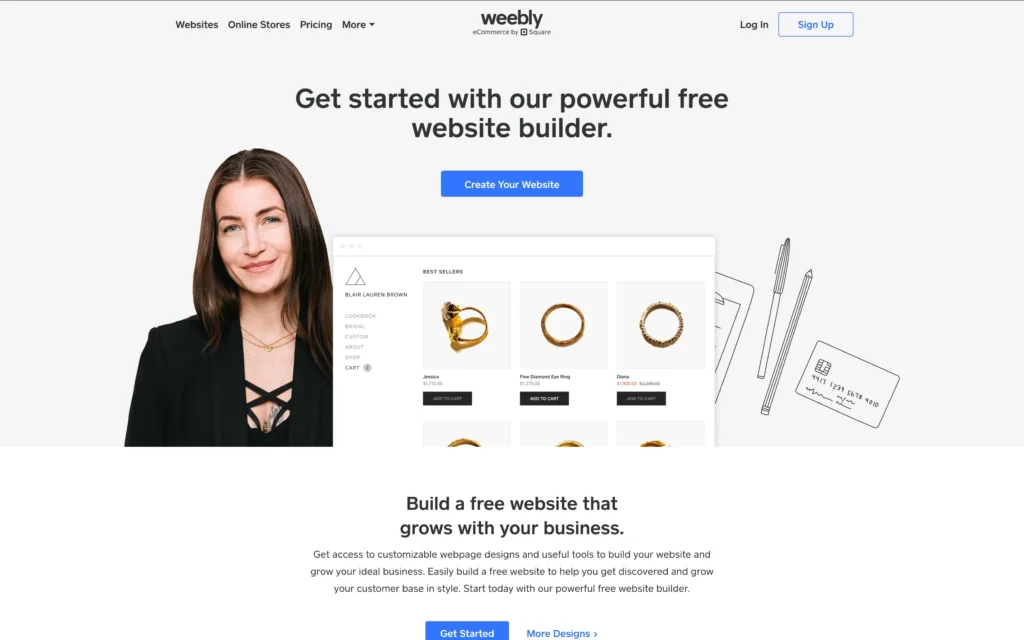
Weebly is an easy-to-use website builder that includes blogging features. It’s a great option for users who need both a website and a blog but don’t want to deal with complex coding.
Weebly is often compared to Wix, but it has fewer design options. However, it offers better blogging tools and is a great choice for business owners who want a blog integrated into their website.
Key Features:
🔹 Drag-and-drop website builder.
🔹 Pre-designed themes with mobile optimization.
🔹 Free hosting & SSL security.
🔹 E-commerce integration (for business blogs).
Best Use Cases:
✔ Business owners who need a blog on their website.
✔ Beginners looking for an easy, all-in-one solution.
✔ Bloggers who want a structured platform with no coding.
Pros:
✅ Simple, drag-and-drop customization.
✅ Free plan includes hosting and security.
✅ Good for business blogs & eCommerce integration.
Cons:
❌ Limited customization compared to WordPress or Wix.
❌ Weebly ads appear on the free plan.
❌ Not ideal for high-traffic or large-scale blogs.
🔗Create a Free Blog with Weebly
7. Ghost – Best for Minimalist & SEO-Focused Blogging
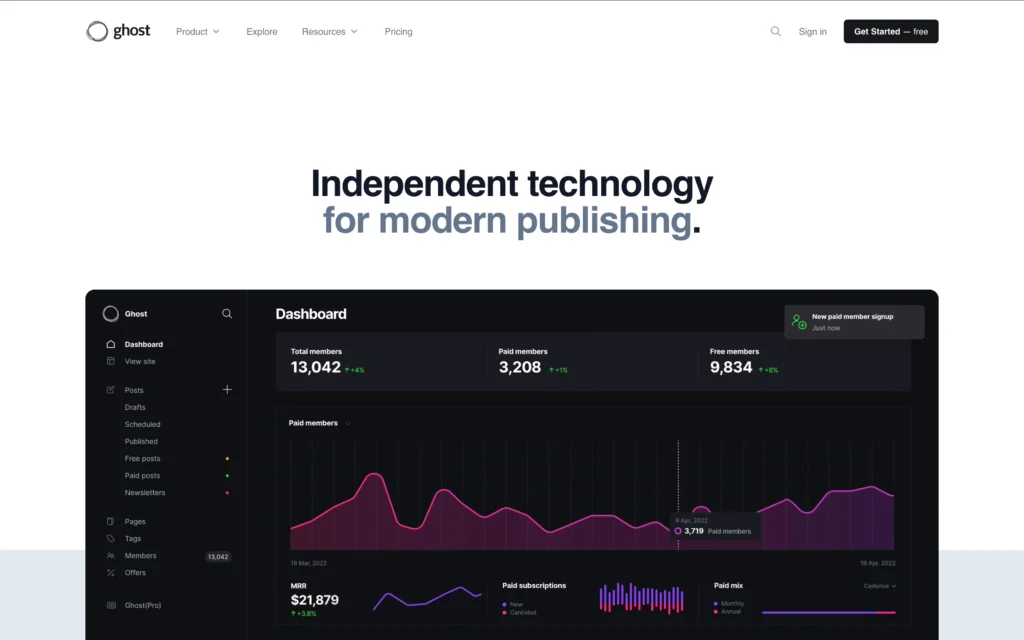
Ghost is a powerful alternative to traditional blogging platforms, designed specifically for writers and publishers who want a fast, distraction-free experience.
This open-source platform is known for its clean interface, speed, and SEO optimization.
One of Ghost’s biggest strengths is its focus on performance. While platforms like WordPress offer extensive themes and plugins, Ghost prioritizes lightweight, fast-loading content.
This makes it an excellent choice for SEO-conscious bloggers who want their content to rank higher on Google. The platform also supports membership and subscription models, which makes it perfect for bloggers looking to build a loyal audience and generate revenue.
Key Features:
🔹 Lightning-fast loading speeds & SEO-friendly architecture.
🔹 Clean, distraction-free writing interface.
🔹 Supports paid memberships & newsletters for monetization.
🔹 Built-in analytics & performance tracking.
Best Use Cases:
✔ Serious bloggers and online publishers.
✔ Writers focused on SEO and fast-loading content.
✔ Monetized blogs that rely on memberships or subscriptions.
Pros:
✅ Minimalist, fast, and distraction-free.
✅ Strong SEO performance.
✅ Supports direct monetization through memberships.
Cons:
❌ Free plan is only available for self-hosted setups.
❌ Requires some technical knowledge to customize fully.
❌ Fewer third-party integrations compared to WordPress.
8. Substack – Best for Newsletter-Based Blogging
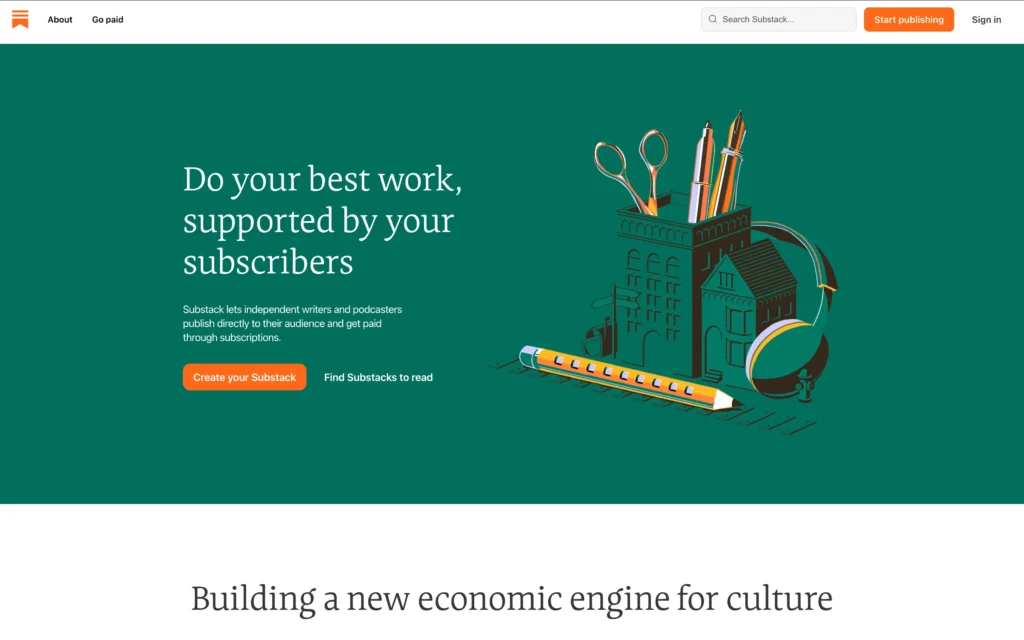
Substack has gained massive popularity as a blogging-meets-newsletter platform, allowing writers to create and distribute content directly to subscribers. It’s a perfect choice for bloggers who want to bypass social media algorithms and build a direct relationship with their audience.
The platform is ideal for writers, journalists, and content creators who want to monetize their writing through subscriptions. Instead of relying on ad revenue, Substack enables bloggers to offer free or paid newsletters, providing an alternative revenue stream.
Substack stands out as one of the best free blogging platforms for newsletters and paid subscriptions.
Key Features:
🔹 Newsletter-first blogging approach.
🔹 Built-in email marketing & subscription options.
🔹 Readers can subscribe and pay for exclusive content.
🔹 No technical setup—just write and publish.
Best Use Cases:
✔ Writers who want direct access to their readers.
✔ Bloggers looking for a subscription-based business model.
✔ Journalists and independent content creators.
Pros:
✅ Easy to use with no setup required.
✅ Direct monetization through subscriptions.
✅ No need to rely on SEO or social media traffic.
Cons:
❌ Limited customization for blog design.
❌ Not ideal for visual-heavy blogs.
❌ Platform fees apply to paid subscriptions.
🔗Start a Free Blog with Substack
9. Jimdo – Best AI-Powered Blog Builder
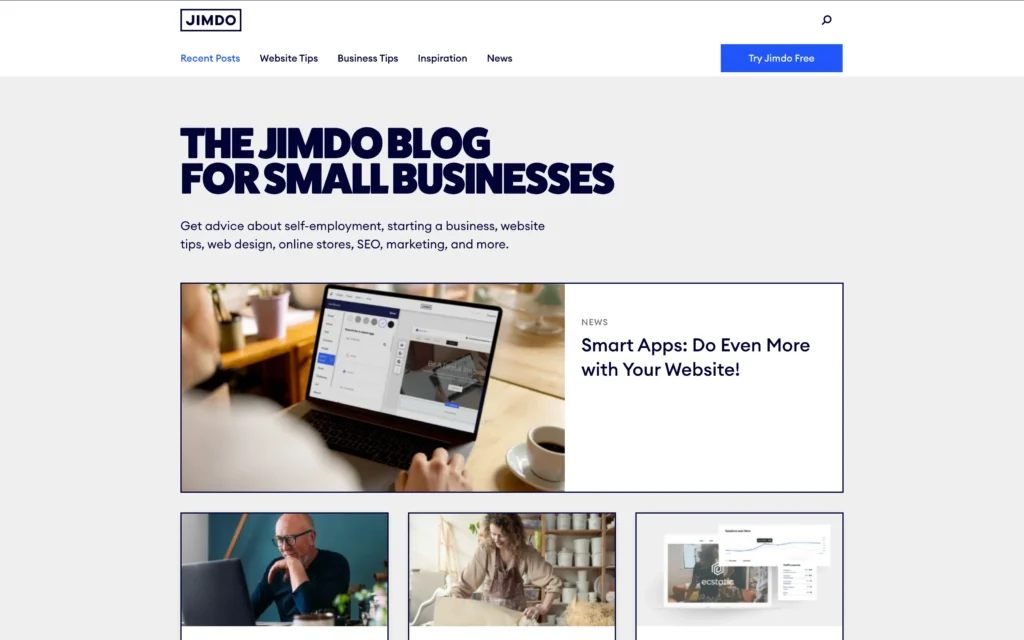
Jimdo is an AI-driven website and blog builder, designed for those who want a hassle-free blogging experience. Unlike platforms that require manual design work, Jimdo automatically generates a fully functional blog based on user preferences.
It’s an excellent choice for beginners who want a simple, no-code blogging solution. The platform includes mobile-optimized designs, free hosting, and SEO features, making it a strong contender in the best free blog hosting sites category.
Key Features:
🔹 AI-powered blog setup for instant website creation.
🔹 Includes free hosting and SSL security.
🔹 SEO tools to help with Google ranking.
🔹 Mobile-optimized themes for better readability.
Best Use Cases:
✔ Beginners who want a no-code blogging experience.
✔ Small business owners who need a quick blog setup.
✔ Bloggers looking for a fast and simple blogging platform.
Pros:
✅ AI-driven site creation simplifies the setup process.
✅ Free hosting and SSL security included.
✅ Easy-to-use platform with mobile-friendly themes.
Cons:
❌ Limited flexibility in design and layout customization.
❌ Not ideal for high-traffic or advanced blogs.
❌ Some advanced SEO features require a paid plan.